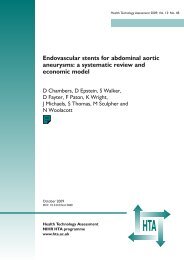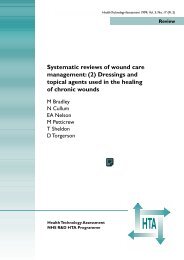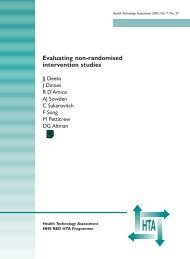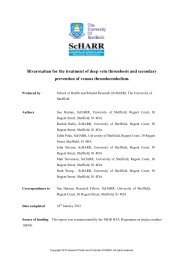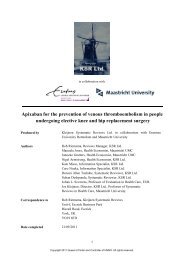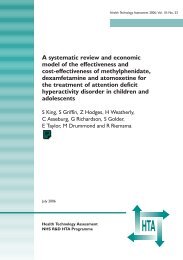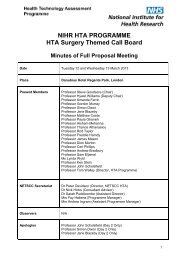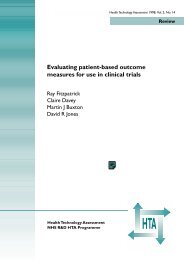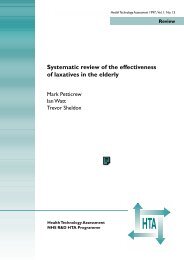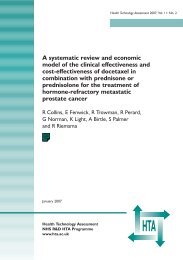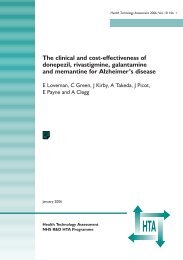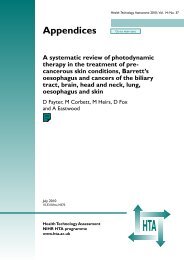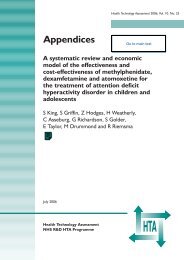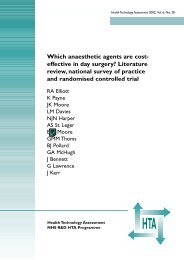How far does screening women for domestic (partner) - NIHR Health ...
How far does screening women for domestic (partner) - NIHR Health ...
How far does screening women for domestic (partner) - NIHR Health ...
Create successful ePaper yourself
Turn your PDF publications into a flip-book with our unique Google optimized e-Paper software.
DOI: 10.3310/hta13160 <strong>Health</strong> Technology Assessment 2009; Vol. 13: No. 16<br />
stress symptoms but did not meet the diagnostic<br />
criteria <strong>for</strong> PTSD was evaluated in a case–control<br />
study by Arinero and Crespo conducted in an<br />
urban setting in Spain. 151 The intervention,<br />
administered in a health-care setting, included<br />
psychoeducation, breathing controlling techniques,<br />
self-esteem improvement procedures, cognitive<br />
therapy, problem-solving and communication<br />
skills training as well as specific strategies <strong>for</strong><br />
relapse prevention. Eight 90-minute sessions were<br />
conducted with groups of 3–5 <strong>women</strong>. Women<br />
in the intervention group, compared with the<br />
waiting list control group, showed a decrease in<br />
post-traumatic and depressive symptoms and an<br />
improvement in adaptation levels up to 6 months’<br />
follow-up. There were no significant changes in the<br />
levels of self-esteem, although there may have been<br />
a ceiling effect as self-esteem levels were already<br />
high at the outset compared with other studies.<br />
The authors point out that the effect sizes were not<br />
as large as those in previous studies, such as that<br />
of Kubany et al., 145 and suggested that this might<br />
be because participants in their study had lower<br />
(i.e. better) symptom scores at baseline, producing<br />
a ceiling effect. There were significant decreases<br />
in depression <strong>for</strong> the intervention group posttreatment;<br />
the authors state this was still significant<br />
at 6 months but no data were presented. The effect<br />
size post-treatment was 0.95, and at the 1-month<br />
follow-up it was 0.66, but effect sizes <strong>for</strong> the 3- and<br />
6-month follow-ups were not presented.<br />
A be<strong>for</strong>e-and-after study, conducted in Mexico by<br />
Cruz and Sanchez, 152 assessed the effectiveness<br />
of a group cognitive behavioural intervention<br />
on promoting self-esteem, coping strategies<br />
and assertiveness in abused spouses of problem<br />
drinkers. The intervention comprised three<br />
components: (1) identifying and correcting<br />
cognitive biases and defective in<strong>for</strong>mation; (2)<br />
establishing emotional regulation strategies;<br />
and (3) acquiring assertiveness skills. Women<br />
received eighteen 150-minute weekly group<br />
sessions. Women’s self-esteem was found to have<br />
improved significantly from pre-test at the 3-,<br />
6- and 18-month follow-ups, but not immediately<br />
after the intervention. There were also significant<br />
improvements in coping strategies at the 3-, 6-<br />
and 18-month follow-ups. Women’s assertiveness<br />
increased significantly from pre-test to the 3- and<br />
6-month follow-up, but this was not sustained at the<br />
18-month follow up.<br />
Studies included in our previous review<br />
Included in our previous review 11 was a parallel<br />
group study by Cox and Stoltenberg 153 in which<br />
© 2009 Queen’s Printer and Controller of HMSO. All rights reserved.<br />
new refuge residents were recruited to a personal<br />
and vocational group psychological programme<br />
that included cognitive therapy, skills building<br />
and problem-solving. The 16 Personality Factors<br />
instrument (16PF) was administered to half of<br />
the intervention group, which was then given full<br />
feedback, creating two intervention subgroups.<br />
The control group received normal refuge care,<br />
which included weekly non-structured counselling<br />
sessions. When assessed immediately after the<br />
cessation of the intervention, both intervention<br />
groups showed significant improvements over<br />
baseline levels of self-esteem. <strong>How</strong>ever, all other<br />
benefits over time, including anxiety, depression,<br />
hostility and assertiveness, were limited to those<br />
<strong>women</strong> who received the intervention without<br />
any feedback from the 16PF. Neither of the two<br />
intervention groups improved in terms of locus of<br />
control. None of the outcome measures improved<br />
over time <strong>for</strong> <strong>women</strong> in the control group.<br />
Cognitive behavioural therapy was also the method<br />
used by Laverde in a randomised controlled trial<br />
in Columbia. 154 Abused <strong>women</strong> in the intervention<br />
arm were given cognitive behavioural therapy, with<br />
lectures and structured exercises. The <strong>women</strong> were<br />
shown models of appropriate and inappropriate<br />
behaviour in different situations, and this was then<br />
followed by role play. Twenty 3-hour group sessions<br />
were held over a period of 11 weeks. Abused<br />
<strong>women</strong> allocated to the control condition attended<br />
a support group; these sessions were unstructured<br />
and aimed to discuss issues around <strong>partner</strong><br />
violence and to provide in<strong>for</strong>mation about the<br />
<strong>women</strong>’s legal rights and the availability of services.<br />
It was found that the frequency and intensity of<br />
abuse decreased markedly in both groups at 15,<br />
30 and 45 days postintervention, but the numbers<br />
were too small <strong>for</strong> any conclusions to be drawn.<br />
Other benefits over time <strong>for</strong> intervention group<br />
participants were also observed. In comparison<br />
with their baseline scores, <strong>women</strong> in this group<br />
significantly improved on several measures:<br />
communication skills, handling of aggression,<br />
assertiveness, and their feelings towards their<br />
<strong>partner</strong>s and the relationship, such as feeling less<br />
sentimental. These improvements did not extend<br />
to the control group, and significant between-group<br />
differences were observed.<br />
A psychoeducational group programme was<br />
evaluated in a parallel group study by Limandri<br />
and May. 155 The content of this programme<br />
included in<strong>for</strong>mation about <strong>partner</strong> violence,<br />
safety planning, stress management, building selfesteem,<br />
coming to terms with loss and grief, and<br />
53



